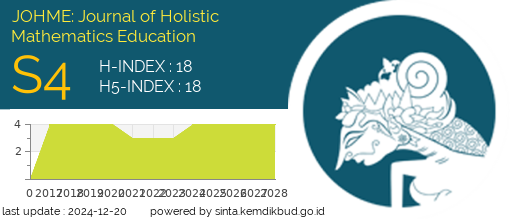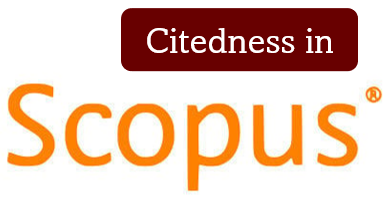USING THE REACT LEARNING MODEL TO REDUCE STUDENT ANXIETY IN LEARNING MATHEMATICS
DOI:
https://doi.org/10.19166/johme.v7i1.6216Keywords:
mathematics anxiety, REACT model learningAbstract
Mathematical anxiety is an emotional response to the entire mathematical activity that affects students' mathematical to psychological abilities. This anxiety is influenced by various factors, such as negative perspectives on mathematics, experiences of failing in learning mathematics, and others. Research data at one Christian High School in Tangerang shows that class X social studies students experience mathematical anxiety where students have difficulty concentrating, are restless, unconfident, and have headaches when learning mathematics. Anxiety affects students' self-confidence and makes the learning process not optimal, so it needs to be reduced. The selection of the REACT model as a solution to this problem leads to varied, contextual, and collaborative learning. The purpose of this writing is to find out the application of the REACT model in reducing the mathematical anxiety of X social studies students. The method used in the research is descriptive qualitative, where data is collected through questionnaires. The results show that the REACT model stages, namely relating, experiencing, applying, cooperating, and transferring, succeeded in reducing the anxiety of class X social studies students towards learning mathematics. During the application of the model, students are seen concentrating while studying, having confidence, daring to ask questions, and others. Applying the REACT model can be a solution for teachers to manage mathematical anxiety while leading students to realize their identity as imago dei who have been reconciled to God in Jesus Christ. Students are endowed with a Divine capacity to do God's work. Reflecting on the implementation of the REACT model, the author suggests recognizing the characteristics of each student the characteristics and collaborating the REACT model with other learning resources.
References
Addai-Mensah, P. (2020). A theological reflection on the concept of sin in Christianity. E-Journal of Humanities, Arts and Social Sciences, 1(4), 106-109. https://doi.org/10.38159/ehass.2020081
Adhinarta, Y. (2021). Pilar-pilar doa. Surabaya, Indonesia: Literatur Perkantas Jawa Timur.
Africk, H., Tobias, S., Kogelman, S., & Warren, J. (1981). Overcoming math anxiety. The Two-Year College Mathematics Journal, 12(1), 59-61. https://doi.org/10.2307/3027194
Anas, A., & A, F. (2018). Penerapan model pembelajaran REACT dalam peningkatan pemahaman konsep siswa. Al-Khwarizmi: Jurnal Pendidikan Matematika dan Ilmu Pengetahuan Alam, 6(2), 157-166. https://doi.org/10.24256/jpmipa.v6i2.338
Anita, I. W. (2014). Pengaruh kecemasan matematika (mathematics anxiety) terhadap kemampuan koneksi matematis siswa SMP. Infinity Journal, 3(1), 125-132. https://doi.org/10.22460/infinity.v3i1.43
Anouti, M. F., Shehayeb, S., & Mchiek, M. (2018). The effect of math anxiety on students’ performance in the intermediate and secondary classes. International Journal of Science and Research, 8(9), 739-745. Retrieved from https://www.ijsr.net/archive/v8i9/ART20201161.pdf
Anugrah, T. M., Kusmayadi, T. A., & Fitriana, L. (2019). Mathematics anxiety in dealing math exams. Journal of Physics: Conference Series, 1157(3), 1-6. https://doi.org/10.1088/1742-6596/1157/3/032101
Aprillia, E., & Lestari, K. E. (2022). Efektivitas model connected mathematics project terhadap kemampuan penalaran matematis dan kecemasan matematika. Jurnal Educatio FKIP UNMA, 8(3), 873-882. https://doi.org/10.31949/educatio.v8i3.2305
Auliya, R. N. (2013). Pengaruh model pembelajaran kooperative tipe CRH (Course, review, hurray) terhadap kemampuan pemahaman matematis dan kecemasan matematika siswa SMP. Retrieved from https://123dok.com/document/z1d50ovz-pengaruh-pembelajaran-kooperatif-kemampuan-pemahaman-matematis-kecemasan-matematika.html
Bavink, H. (2011). Dogmatika reformed. Surabaya, Indonesia: Momentum.
Cahyono, B. A. D., Sutarto, & Mahardika, I. K. (2017). Model pembelajaran REACT (Relating, experiencing, applying, cooperating, transfering) disertai media video kejadian fisika terhadap keterampilan proses sains dan hasil belajar siswa dalam pembelajaran fisika di SMA. Jurnal Edukasi, 4(3), 20-24. https://doi.org/10.19184/jukasi.v4i3.6155
Dewi, N. A. K., & Utami, B. H. S. (2020). Pengembangan perangkat pembelajaran fisika berbasis react sebagai implementasi K13 untuk memfasilitasi keheterogenen gaya belajar siswa SMA/MA di kota Bandar Lampung. Jurnal Pendidikan Fisika, 8(2), 158-171. https://doi.org/10.24127/jpf.v8i2.3098
Diana, P., Marethi, I., & Pamungkas, A. S. (2020). Kemampuan pemahaman konsep matematis siswa: Ditinjau dari kategori kecemasan matematik. SJME (Supremum Journal of Mathematics Education), 4(1), 24-32. https://doi.org/10.35706/sjme.v4i1.2033
Driscoll, M., & Breshears, G. (2020). What Christians should believe. Wheaton, Ill.: Crossway Bibles.
Dwirahayu, G., & Mas’ud, A. (2018). Mengurangi kecemasan matematika siswa dalam pembelajaran. Retrieved from https://www.researchgate.net/publication/329069950_Mengurangi_Kecemasan_Matematika_Siswa_dalam_Pembelajaran/link/5ce4ecb392851c4eabb4fb03/download
Erwina, E., Jamal, M. A., & Hartini, S. (2015). Meningkatkan hasil belajar siswa melalui model pembelajaran relating, experiencing, applying, cooperating dan transferring (REACT). Berkala Ilmiah Pendidikan Fisika, 3(2), 122-131. https://doi.org/10.20527/bipf.v3i2.753
Fadilah, N. N., & Munandar, D. R. (2019). Analisis tingkat kecemasan matematis siswa SMP. Journal Unsika Sesiomadika, 2(1), 459-467. Retrieved from https://journal.unsika.ac.id/index.php/sesiomadika/article/view/2757
Fani, A. A. D., & Effendi, K. N. S. (2021). Kemampuan koneksi matematis siswa ditinjau dari kecemasan belajar pada siswa SMP pada materi lingkaran. JPMI (Jurnal Pembelajaran Matematika Inovatif), 4(1), 137-148. Retrieved from https://journal.ikipsiliwangi.ac.id/index.php/jpmi/article/view/6549/2135
Faried, L., & Nashori, F. (2013). Hubungan antara kontrol diri dan kecemasan menghadapi masa pembebasan pada narapidana di lembaga pemasyarakatan Wirogunan Yogyakarta. Khazanah, 5(2), 63-74. https://doi.org/10.20885/khazanah.vol5.iss2.art6
Fatimah, I. D. (2022). Model-model pembelajaran (1st ed.). Solok, Indonesia: Yayasan Pendidikan Cendekia Muslim.
Fauziah, A. (2010). Peningkatan kemampuan pemahaman dan pemecahan masalah matematik siswa SMP melalui strategi REACT. Forum Kependidikan, 30(1), 1-13. Retrieved from https://adoc.pub/peningkatan-kemampuan-pemahaman-dan-pemecahan-masalah-matema.html
Febryanti, Samad, I., & Wendi. (2021). Peningkatan kemampuan penalaran matematis siswa melalui model pembelajaran relating, experiencing, applying, cooperating, transferring (REACT). Jurnal Peqguruang: Conference Series, 3(2), 479-483. https://doi.org/10.35329/jp.v3i2.2733
Feby, & Abadi, A. P. (2020). Model pembelajaran relating, experiencing, applying, cooperating, transferring (REACT) berbasis etnomatematika. Prosiding Sesiomadika, 938-944. Retrieved from https://journal.unsika.ac.id/index.php/sesiomadika/article/view/2568
Ferguson, S. B. (2002). Hati yang dipersembahkan kepada Allah. Surabaya, Indonesia: Penerbit Momentum.
Hannah, R. (2013). The effect of classroom environment on student learning [Thesis]. Retrieved from https://scholarworks.wmich.edu/honors_theses/2375/
Ismaya, S., Subiki, & Harijanto, A. (2015). Penerapan model pembelajaran relating, experiencing, applying, cooperating, and transferring (REACT) terhadap motivasi dan hasil belajar dalam pembelajaran fisika di SMA. Jurnal Pendidikan Fisika, 4(2), 121-127. Retrieved from https://www.semanticscholar.org/paper/PENERAPAN-MODEL-PEMBELAJARAN-RELATING%2C-APPLYING%2C-DI-Ismaya-Subiki/c879767f18c61c702361b24c45d6cbba0990e20a
Istikomah, E., & Wahyuni, A. (2018). Student’s mathematics anxiety on the use of technology in mathematics learning. JRAMathEdu (Journal of Research and Advances in Mathematics Education), 3(2), 69-77. https://doi.org/10.23917/jramathedu.v3i2.6364
Johnson, D. (2015). Truth weaving: Biblical integration for God’s glory and their abundant living. Turkey: Waking Elms Press.
Jongsma, C. (2007). Mathematics: Always important, never enough: A Christian perspective on mathematics and mathematics education. Pro Rege, 35(4), 21-38. Retrieved from https://digitalcollections.dordt.edu/cgi/viewcontent.cgi?article=1420&context=pro_rege
Junedi, B., & Ayu, D. M. (2018). Penerapan strategi relating, experiencing, applying, cooperating and transfering (REACT) terhadap pemahaman konsep matematika siswa kelas VIII. MES: Journal of Mathematics Education and Science, 3(2), 125-132. https://doi.org/10.30743/mes.v3i2.502
Khasawneh, E., Gosling, C., & Williams, B. (2021). What impact does maths anxiety have on university students? BMC Psychology, 9(1), 1-9. https://doi.org/10.1186/s40359-021-00537-2
Kholiyanti, A. (2018). Pembelajaran matematika dari konkrit ke abstrak dalam membangun konsep dasar geometri bagi siswa sekolah dasar. Pi: Mathematics Education Journal, 1(2), 40-46. https://doi.org/10.21067/pmej.v1i2.2322
Lestari, L. A., Sahputra, R., & Lestari, I. (2021). Penerapan model REACT terhadap pemahaman konsep siswa kelas XI SMA. Orbital: Jurnal Pendidikan Kimia, 5(2), 151-162. https://doi.org/10.19109/ojpk.v5i2.9396
Lowe, E. J. (2011). The truth about math. Retrieved from https://digitalcommons.andrews.edu/cgi/viewcontent.cgi?article=1306&context=luh-pubs
Mariska, Kurniawan, Setyadi, E., & Fatmaryanti, Siska, D. (2013). Efektivitas pemberian apersepsi dan motivasi dalam meningkatkan pemahaman konsep siswa pada pokok bahasan gaya SMP Negeri 13 Purworejo. Radiasi: Jurnal Berkala Pendidikan Fisika, 3(2), 160-165. Retrieved from http://jurnal.umpwr.ac.id/index.php/radiasi/article/view/441/310
Masitoh, I., & Prabawanto, S. (2014). Peningkatan pemahaman konsep matematika dan kemampuan berfikir kritis matematis siswa kelas V sekolah dasar melalui pembelajaran eksloratif. EduHumaniora: Jurnal Pendidikan Dasar Kampus Cibiru, 7(2), 1-11. https://doi.org/10.17509/eh.v7i2.2709
Mushawwir, M. A., & Umar, F. (2014). Studi tentang keterampilan guru dalam melaksanakan apersepsi pada pembelajaran PPKN di SMP Negeri 1 dan SMP Negeri 2 Benteng Kabupaten Selayar. Tomalebbi, 1(2), 103-111. Retrieved from https://ojs.unm.ac.id/index.php/tomalebbi/article/view/1828
Muskita, N. S., Ramadhani, V. M., Kusumaningtyas, Mulawarman, U., & Loss, L. (2022). Blended learning : Solusi mengatasi learning loss. SAP, 7(2), 187-195. http://dx.doi.org/10.30998/sap.v7i2.13368
Muqorobin, & Triana, H. (2022). Validitas instrumen tingkat kecemasan siswa terhadap pembelajaran matematika dalam penelitian eksperimen. Jurnal Ilmu Sosial dan Pendidikan (JISIP), 6(2), 4173-4181. http://dx.doi.org/10.36312/jisip.v6i1.2605
Murray, A. (1901). Working for God. New York, NY: Fleming H. Revell.
Mutlu, Y. (2019). Math anxiety in students with and without math learning difficulties. International Electronic Journal of Elementary Education, 11(5), 471-475. https://doi.org/10.26822/iejee.2019553343
Mutodi, P., & Ngirande, H. (2014). Exploring mathematics anxiety: Mathematics students’ experiences. Mediterranean Journal of Social Sciences, 5(1), 283-294. https://doi.org/10.5901/mjss.2014.v5n1p283
MZ, Z. A., Rendani, F., Nainggolan, M. S., & Jannah, N. (2018). Pembelajaran kooperatif dalam mereduksi kecemasan matematis siswa (Math anxiety). Jurnal Prinsip Pendidikan Matematika, 1(1), 23-27. https://doi.org/10.33578/prinsip.v1i1.17
Nabilah, E., Umam, K., Azhar, E., & Purwanto, S. E. (2021). Kecemasan siswa dalam menyelesaikan masalah modelling matematika pada praktek kelas virtual. International Journal of Progressive Mathematics Education, 1(1), 41-60. https://doi.org/10.22236/ijopme.v1i1.6595
Nuraisah, E., Irawati, R., & Hanifah, N. (2016). Perbedaan pengaruh penggunaan pembelajaran konvensional dan pendekatan kontekstual terhadap kemampuan berpikir kritis matematis dan motivasi belajar siswa pada materi pecahan. Jurnal Pena Ilmiah, 1(1), 291-300. Retrieved from https://ejournal.upi.edu/index.php/penailmiah/article/view/3033/pdf
Nuryana, A. (2010). Efektivitas brain gym dalam meningkatkan konsentrasi belajar pada anak. Ilmiah Berkala Psikologi, 12(1), 88-98. Retrieved from https://publikasiilmiah.ums.ac.id/xmlui/handle/11617/3504
Olango, M. (2016). Mathematics anxiety factors as predictors of mathematics self-efficacy and achievement among freshmen science and engineering students. African Educational Research Journal, 4(3), 109-123. Retrieved from https://files.eric.ed.gov/fulltext/EJ1216175.pdf
Parinding, L., & Tangkin, W. P. (2022). Cara pandang guru Kristen terhadap siswa sebagai gambar dan rupa Allah yang membutuhkan pemuridan. Jurnal Teologi dan Pendidikan Kristen, 4(1), 97-106. Retrieved from http://download.garuda.kemdikbud.go.id/article.php?article=2559378&val=24034&title=Cara Pandang Guru Kristen Terhadap Siswa Sebagai Gambar dan Rupa Allah yang Membutuhkan Pemuridan
Putri, R. I., & Santosa, R. H. (2015). Keefektifan strategi REACT ditinjau dari prestasi belajar, kemampuan penyelesaian masalah, koneksi matematis, self efficacy. Jurnal Riset Pendidikan Matematika, 2(2), 262-272. https://doi.org/10.21831/jrpm.v2i2.7345
Ramadan, D. (2019). Kecemasan siswa dalam belajar matematika. Jurnal Pendidikan Matematika Unimed. Retrieved from https://www.researchgate.net/publication/333076983_Kecemasan_Siswa_Dalam_Belajar_Matematika
Ramadhani, F., & Jazwinarti. (2019). Pengaruh strategi pembelajaran relating, experiencing, appliying, cooperating, transfering terhadap kemampuan pemahaman konsep matematis peserta didik kelas X MIPA SMAN 5 Bukittinggi. Jurnal Edukasi dan Penelitian Matematika, 8(1), 57-65. Retrieved from http://ejournal.unp.ac.id/students/index.php/pmat/article/view/6237/3148
Redgrave, K. (2002). Anxious Christians. London, UK: British Library.
Riadi, M. (2022). Strategi pembelajaran REACT. Retrieved from https://www.kajianpustaka.com/2022/07/strategi-pembelajaran-react.html#:~:text=b.,-Kekurangan&text=Kekurangan atau kelemahan strategi pembelajaran,sulit untuk mencapai target kurikulum.
Rizka, N., Syarifuddin, H., & Suherman. (2014). Pengaruh penerapan strategi relating, experiencing, applying, cooperating, transferring terhadap kemampuan pemahaman konsep matematika siswa kelas X SMAN 2 Payakumbuh. Jurnal Pendidikan Matematika, 3(2), 44-48. Retrieved from http://docplayer.info/50381455-Vol-3-no-2-2014-jurnal-pendidikan-matematika-part-1-hal-nela-rizka-1-hendra-syarifuddin-2-suherman-3-abstract.html
Rizki, F., Rafianti, I., & Marethi, I. (2019). Pengaruh kecemasan matematika terhadap kemampuan pemecahan masalah siswa di SMA. GAUSS: Jurnal Pendidikan Matematika, 2(2), 11-23. https://doi.org/10.30656/gauss.v2i2.1750
Sapto, A. D., Suyitno, H., & Susilo, B. E. (2015). Keefektifan pembelajaran strategi REACT dengan model SSCS terhadap kemampuan komunikasi matematika dan percaya diri siswa kelas VIII. Unnes Journal of Mathematics Education, 4(3), 223-229. Retrieved from https://journal.unnes.ac.id/sju/index.php/ujme/article/view/9049/5850
Saputra, P. R. (2014). Kecemasan matematika dan cara menguranginya (Mathematic anxiety and how to reduce it). Jurnal Phytagoras, 3(2), 75-84. Retrieved from https://journal.unrika.ac.id/index.php/jurnalphythagoras/article/view/590/451
Sari, Y. P., Zakiyah, & Dewi, A. (2021). Tipe kepribadian dengan tingkat kecemasan mahasiswa personality types with anxiety level in students. Binawan Student Journal, 3(1), 29-35. Retrieved from https://www.academia.edu/93992454/Tipe_Kepribadian_Dengan_Tingkat_Kecemasan_Mahasiswa_Yang_Sedang_Menyusun_Skripsi
Selamet, K., Sadia, I. W., & Suma, K. (2013). Pengaruh model pembelajaran kontekstual REACT terhadap pemahaman konsep fisika dan keterampilan proses sains siswa kelas VIII SMP. E-Journal Program Pascasarjana Universitas Pendidikan Ganesha Program Studi IPA, 3(1), 1-12. Retrieved from https://ejournal-pasca.undiksha.ac.id/index.php/jurnal_ipa/article/view/751/537
Setiawan, M., Pujiastuti, E., & Susilo, B. E. (2021). Tinjauan pustaka systematik: Pengaruh kecemasan matematika terhadap kemampuan pemecahan masalah siswa. QALAMUNA: Jurnal Pendidikan, Sosial, Dan Agama, 13(2), 239-256. https://doi.org/10.37680/qalamuna.v13i2.870
Sinaga, M., & Silaban, S. (2020). Implementasi pembelajaran kontekstual untuk aktivitas dan hasil belajar kimia siswa. Gagasan Pendidikan Indonesia, 1(1), 33. https://doi.org/10.30870/gpi.v1i1.8051
Siregar, N. R. (2017). Persepsi siswa pada pelajaran matematika: Studi pendahuluan pada siswa yang menyenangi game. Prosiding Temu Ilmiah X Ikatan Psikologi Perkembangan Indonesia, 224-232. Retrieved from https://core.ac.uk/download/pdf/236378368.pdf
Soleh, A., Candiasa, I. M., & Widiartini, N. K. (2014). Pengaruh pembelajaran remedial berbantuan tutor sebaya terhadap prestasi belajar matematika siswa yang mengalami kesulitan belajar dengan kovariabel tingkat kecemasan. Jurnal Penelitian dan Evaluasi Pendidikan Indonesia, 4(1), 1-10. Retrieved from https://ejournal-pasca.undiksha.ac.id/index.php/jurnal_ep/article/view/1222/954
Sugiawan, R., Nurhanurawati, N., & Coesamin, M. (2014). Meningkatkan aktivitas dan hasil belajar matematika melalui pembelajaran kooperatif tipe NHT. Jurnal Pendidikan Matematika Unila, 2(3), 1-12. Retrieved from http://jurnal.fkip.unila.ac.id/index.php/MTK/article/view/4655/2899
Sulastri, A. (2016). Penerapan pendekatan kontekstual dalam pembelajaran matematika untuk meningkatkan pemahaman konsep matematis siswa sekolah dasar. Jurnal Pendidikan Guru Sekolah Dasar, 1(1), 156-170. https://doi.org/10.17509/jpgsd.v1i1.9068
Tari, D. K., & Rosana, D. (2019). Contextual teaching and learning to develop critical thinking and practical skills. Journal of Physics: Conference Series, 1233, 1-8. https://doi.org/10.1088/1742-6596/1233/1/012102
Tatiana, Pranuta Murnaka, N., & Wiyanti, W. (2018). Pengaruh kecemasan matematika (Mathematics anxiety) terhadap hasil belajar matematika siswa SMP. Aksioma, 9(1), 124-133. Retrieved from https://www.researchgate.net/publication/342150771_Pengaruh_Kecemasan_Matematika_mathematics_Anxiety_Terhadap_Hasil_Belajar_Matematika_Siswa_Smp_Tatiana_Nerru_Pranuta_Murnaka_dan_Wiwik_Wiyanti
Waheed, H., & Mohamad, L. (2011). Secondary students’ attitude towards mathematics in a selected school of Maldives. International Journal of Humanities and Social Science, 1(15), 277-281. Retrieved from https://www.ijhssnet.com/journals/Vol_1_No_15_Special_Issue_October_2011/34.pdf
Wahyuni, R. (2016). Menciptakan pembelajaran yang menyenangkan dan bermakna dengan metode quantum teaching. Retrieved from http://restulifeact.blogs.uny.ac.id/wp-content/uploads/sites/15431/2017/10/Restu-Wahyuni_Menciptakan-Pembelajaran-Menyenangkan-dan-Bermakna.pdf
Wahyuni, S., Yati, M., & Fadila, A. (2020). Pengembangan modul matematika berbasis REACT terhadap kemampuan komunikasi matematis peserta didik. Jambura: Journal of Mathematics Education, 1(1), 1-12. https://doi.org/10.34312/jmathedu.v1i1.4542
Wibawati, S. A., Sumarmi, Taryana, D., & Suharto, Y. (2022). Pengaruh model pembelajaran relating, experiencing, applying, cooperating, transferring (REACT) terhadap hasil belajar geografi siswa kelas X. Jurnal Integrasi dan Harmoni Inovatif Ilmu-Ilmu Sosial (JIHI3S), 2(2), 172-183. Retrieved from https://www.researchgate.net/publication/370649936_Pengaruh_model_pembelajaran_Relating_Experiencing_Applying_Cooperating_Transferring_REACT_terhadap_hasil_belajar_Geografi_siswa_kelas_X
Williamson, G. I. (2017). Pengakuan iman Westminster: Untuk kelas penelaahan. Surabaya, Indonesia: Momentum.
Winarso, W. (2014). Pengaruh perbedaan tipe kepribadian terhadap sikap belajar matematika siswa SMA Islam Al-Azhar 5 Cirebon. Jurnal Pendidikan Matematika, 2(1), 95-115. https://doi.org/10.18592/jpm.v2i1.1170
Yanti, S., Erlamsyah, & Zikra. (2013). Hubungan antara kecemasan dalam belajar dengan motivasi belajar siswa. Jurnal Ilmiah Konseling, 2, 283-288. http://dx.doi.org/10.24036/02013211242-0-00
Yeni, E. M. (2015). Kesulitan belajar matematika di sekolah dasar. Jurnal Pendidikan Dasar, 2(2), 1-10. Retrieved from https://www.neliti.com/publications/71281/kesulitan-belajar-matematika-di-sekolah-dasar
Zamili, U. (2018). Peningkatan efikasi diri siswa melalui pendidikan agama Kristen berbasis tematik. Jurnal Teologi Cultivation, 2(2), 435-442. Retrieved from http://jurnal.stakpntarutung.ac.id/index.php/Jurnal-Teologi-CultivationDownloads
Additional Files
Published
How to Cite
Issue
Section
License
Authors who publish with this journal agree to the following terms:
1) Authors retain copyright and grant the journal right of first publication with the work simultaneously licensed under a Creative Commons Attribution License (CC-BY-SA 4.0) that allows others to share the work with an acknowledgement of the work's authorship and initial publication in this journal.
2) Authors are able to enter into separate, additional contractual arrangements for the non-exclusive distribution of the journal's published version of the work (e.g., post it to an institutional repository or publish it in a book), with an acknowledgement of its initial publication in this journal.
3) Authors are permitted and encouraged to post their work online (e.g., in institutional repositories or on their website). The final published PDF should be used and bibliographic details that credit the publication in this journal should be included.”










